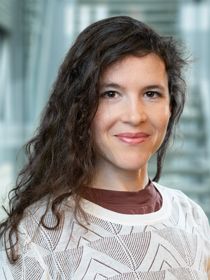In the project RESTATE, the migration researcher is looking at how refugees perceive the state and violence exerted by the state before, during and after their flight and how these experiences influence their political participation. The aim is to develop a dynamic understanding of these correlations, to analyze the effects of state violence on trust in institutions and to theorize the conditions and consequences of refugees' political participation. After postdoctoral research at the Universities of Oxford and Amsterdam and at the Leibniz Institute of Global and Area Studies, Lea Müller-Funk is currently Senior Researcher and Elise Richter Fellow at the Department for Migration and Globalisation at the University for Continuing Education Krems.
In her ERC project “Refugees' Political Participation and State-(Re)Making in Displacement” (RESTATE), Lea Müller-Funk examines how refugees perceive the state, particularly in the context of state violence. In today's world, most refugees come from states where civil war and extreme violence prevail and the legitimacy of the state as a protector is uncertain. In addition, during their flight, people were repeatedly exposed to various forms and different intensities of violence by state actors in the host countries – regardless of whether they sought protection in authoritarian or democratic states. Nevertheless, little is known about how refugees perceive and deal with the state as an institution during their flight and how these perceptions shape their role as political actors.
Impact on trust in the state
The RESTATE project, which focuses on the political agency of refugees, aims to develop a dynamic understanding of refugees' experiences and interactions with the state during their displacement. It also identifies which forms of state action, both in countries of origin and host countries, undermine trust in state institutions and potentially provoke political resistance. The conditions for the political participation of refugees during their displacement and the effects of the political participation of refugees in both the countries of origin and the host countries on processes of “state-building” are also examined.
Using a comparative, cross-method and cross-location approach, the project examines the displacement of refugees from three civil war countries (Afghanistan, South Sudan and Syria) in four major host countries (Iran, Türkiye, Uganda and Germany). The aim is to develop an innovative theory on the political agency of refugees in state-building processes. The researcher also sees concrete areas of application where the results of the project can be used: “The empirical findings will provide relevant information on possible ways of peacebuilding, conflict resolution and political inclusion,” says Lea Müller-Funk.
Müller-Funk has already worked on the topic of migration and flight in several research projects, including the Marie Curie project SYRMAGINE (Syrian Imagination of Europe, 2017–2019), the Horizon2020-funded MAGYC (Migration Governance and Asylum Crises, 2019–2021) and SYREALITY (Syrian Imagination of Europe meets Reality, 2022–2026).
About the ERC Starting Grants
Established by the European Union in 2007, the European Research Council is the main European funding organization for excellent pioneering research. Its funds, part of the EU's Horizon Europe program, are invested in scientific projects spanning all research disciplines. Starting Grants support young scientists who have already produced excellent research work. This is the second time that the Department for Migration and Globalisation at the University for Continuing Education Krems has been successful with the ERC Starting Grants.
Tags
